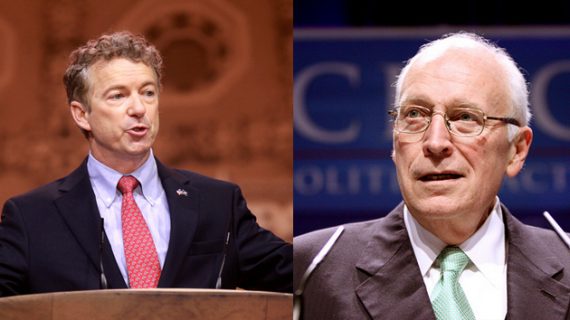Rand Paul, Dick Cheney, And The Foreign Policy Battle Inside The GOP
The Kentucky Senator and former Vice-President are at the front of a battle that will unfold inside the GOP as we head toward 2016.
The ongoing crisis in Iraq has ignited a foreign policy debate inside the Republican Party that extends not only forward toward the question of what the United States should do in response to the advances of ISIS/ISIL but also the legacy of the war launched by the Bush/Cheney Administration in 2003. On the one side, there’s Kentucky Senator and possible 2016 Presidential candidate Rand Paul said in a weekend Op-Ed in The Wall Street Journal that the United States should not choose sides in what he characterized as an Iraqi civil war:
Much of the rationale for going to war in 2003 did not measure up to the Weinberger Doctrine, and I opposed the Iraq war. I thought we needed to be more prudent about the weightiest decision a country can make. Like Reagan, I thought we should never be eager to go to war. And now, 11 years later, we are still dealing with the consequences.
The Middle East is less stable than in 2003. The Iraq war strengthened Iran’s influence in Iraq and throughout the Middle East. Sunni extremists backed by Saudi Arabia, Kuwait and Qatar have filled the vacuum. The Islamic State of Iraq and Syria (ISIS) has taken over the cities of Mosul, Tikrit and is on the march to Baghdad.
While President Obama said Thursday he will not send “combat troops,” he said he is sending 300 military advisers and he has 275 servicemen to guard the U.S. Embassy. Few are advocating for boots on the ground but many are calling for airstrikes.
Let me address both of these. First, we should not put any U.S. troops on the ground in Iraq, unless it is to secure or evacuate U.S. personnel and diplomatic facilities. And while we may not completely rule out airstrikes, there are many questions that need to be addressed first.
What would airstrikes accomplish? We know that Iran is aiding the Iraqi government against ISIS. Do we want to, in effect, become Iran’s air force? What’s in this for Iran? Why should we choose a side, and if we do, who are we really helping?
This administration, through bad decision-making that I specifically warned against, has already indirectly aided al Qaeda and ISIS in Syria—the very group some now propose to counter with U.S. troops.
For the small group calling for boots on the ground—how can we ask our brave men and women to risk their lives for a country the Iraqis aren’t willing to fight for themselves? Iraqi soldiers are stripping off their uniforms and fleeing this fight. We shouldn’t ask our soldiers to put their uniforms on to take their places.
(…)
No matter what the administration is planning, I also insist that it go through Congress. President Obama declared this war over and even asked Congress to rescind its 2002 Authorization for Use of Military Force Against Iraq, something I agreed with. If he or others want a new war or military action, they need a new approval, from Congress, or I will oppose them.
The U.S. spent eight years training the Iraqis and nearly a decade of war has brought us to this point. Those who say it was a mistake to leave are forgetting that Prime Minister Nouri al-Maliki’s government was demanding we leave in 2011.
Those who say we must re-engage in Iraq are also forgetting an important part of the Weinberger Doctrine: “U.S. troops should not be committed to battle without a ‘reasonable assurance’ of the support of U.S. public opinion and Congress.” To attempt to transform Iraq into something more amenable to our interests would likely require another decade of U.S. presence and perhaps another 4,000 American lives—a generational commitment that few Americans would be willing to make.
Many of those clamoring for military action now are the same people who made every false assumption imaginable about the cost, challenge and purpose of the Iraq war. They have been so wrong for so long. Why should we listen to them again?
Paul said pretty much the same thing in an appearance on Meet The Press on Sunday:
None of this is unusual for the Kentucky Senator, of course. Although he has not been as extreme on the issue as his father, Rand Paul has generally been a strong voice for non-interventionism and against the agenda that continues to be pushed by the people that supported the Bush Administration’s policies during the last decade, most notable during the speech he gave at the 2012 Republican National Convention. Paul’s opponents inside the GOP have pushed back against his arguments quite regularly, usually by dismissing him as a “isolationist” as they do with anyone who questions the wisdom of the kind of ‘democratic interventionism’ that was typified by the Bush’s Administration to launch an invasion and occupation of Iraq. Much of that pushback has come from conservative bloggers such as Jonathan Tobin, Peter Wehner, andPaul Mirengoff. The interesting battle, though, is the one being led by the former Vice President who was very much the public face for the policies that Paul and those who support him are speaking out against:
Republican Sen. Rand Paul is “basically an isolationist,” according to former Vice President Dick Cheney, who expressed his concern with the idea of the Kentucky senator being the GOP nominee during the next presidential cycle.
“Now, Rand Paul and — by my standards, as I look at his — his philosophy, is basically an isolationist,” Cheney told ABC News’ Jonathan Karl this morning on “This Week.” “That didn’t work in the 1930s, it sure as heck won’t work in the aftermath of 9/11, when 19 guys armed with airline tickets and box cutters came all the way from Afghanistan and killed 3,000 of our citizens.”
Cheney said he believes its essential that the United States is involved in the Middle East.
“He [Paul] doesn’t believe we ought to be involved in that part of the world,” added Cheney. “I haven’t picked a nominee yet. But one of the things that’s right at the top of my list is whether or not the individual we nominate believes in a strong America, believes in a situation where the United States is able to provide the leadership in the world, basically, to maintain the peace and to take on the al Qaeda types wherever they show up.”
(…)
Cheney dismissed criticism of his own prior statements and actions on the Iraq War, saying during the interview “if we spend our time debating what happened 11 or 12 years ago, we’re going to miss the threat that is growing and that we do face.” He added that there are no “good” or “easy” answers when it comes to Iraq today, but it is important to acknowledge the scope of the problem and that it extends to the broader region.
“I think it’s very important to emphasize that the problem we’re faced with is a much broader one, that we need to — an administration to recognize the fact that we’ve got this huge problem, quit peddling the notion that they — they got core al Qaeda and therefore there’s no problem out there,” Cheney said.
Here’s the video of Cheney’s appearance:
Leaving aside the question of why Dick Cheney should be taken seriously when it comes to foreign policy, the comments that he and others have made about Paul are evidence of what could be a real battle over foreign policy in the Republican Party as we had toward the 2016 elections:
“It’s all about Rand Paul because he is the most prominent voice of questioning their primacy and offering a different vision, a less interventionist vision, for the party in terms of foreign policy,” said one senior Republican operative of the neoconservatives.
But, the operative argued, it’s less about Paul himself and more about his ideology creating a safer space for less hawkish foreign policy ideas on the right:
“It may come to be all about Rand in terms of stopping him from being the nominee, but I think it’s all about he’s putting out there an edge to the debate that creates a middle ground. He’s not way over where his father is, so that middle ground has moved to a place that’s more plausible.”
The neoconservatives are “in a hard spot. They’re inevitably tied to Iraq so it’s a very hard thing.”
(…)
Some neoconservative figures privately dismissed the idea that Paul and his wing of the party pose a real threat to a muscular Republican foreign policy, arguing that Paul has actually tried to move farther to the right on foreign policy (he has reached out to the pro-Israel community and supported cutting off aid to the Palestinian Authority, for example) and that the young candidates in the party are mostly hawkish.
Still, Paul is likely to run for president and neutralizing him, even if not the prime focus of the current neoconservative renaissance surrounding the Iraq crisis, could be an added bonus, said Republican strategist Rick Wilson.
“I do think it’s an ancillary benefit to talking about if for folks that have a concern that the isolationist streak in Paul world is dangerous for the country,” Wilson said. Hawks are “making the case that the Obama policy on Iraq is not where we need to be but reminding people that Rand Paul has a lot of conflicting messages and a lot of conflicting statements.”
As I’ve noted before, when people like Cheney label someone like Paul an “isolationist,” they are doing it primarily in an effort to shut down debate rather than addressing the argument they claim to oppose on the merits. “Isolationism,” after all, has become synonymous with the America First crowd that existed in the United States in the years between World War One and World War Two and which played a large role in everything from the defeat of Woodrow Wilson’s bid to enter the League of Nations to opposition to President Roosevelt’s efforts to provide aid to Europe in general and Great Britain specifically in the years before the attack on Pearl Harbor. Since then, the label has been tossed around rather casually however, as I’ve noted before — here, here, and here — there’s a difference between a foreign policy that rejects the idea of intervention in foreign conflicts that do no directly implicate American national interests, and the “isolationism” that Cheney and other claim that Paul and his supporters are advocating. Contrary to what Cheney and others claim, Paul isn’t advocating the disengagement with the affairs of the world that was typical of 1930s era isolationism. Instead, he’s basically saying that our first response to a foreign “crisis” should be something other than trying to figure out how we can fix it, it should instead be to ask whether it’s even our job to “fix” it all and whether its something we can realistically fix to begin with. In the meantime, non-interventionists tend to be strong supporters of international trade and diplomacy, and often point out that we can accomplish more in the world by approaching other nations peacefully than approaching them as potential adversaries. That strikes me as a rather realistic way to look at the world, and it stands in stark contrast to view of those like Cheney who seem to believe that the United States either can or should fix every problem in the world.
This is an argument that we are likely to see played out inside the GOP quite a lot in the years to come, especially if Paul does run for President as many expect. As things stand right now, polling does indicate that there is strong and growing support for the ideas that he has proposed on this subject inside the Republican Party, and that may be the reason we see people like Cheney, former United Nations Ambassador John Bolton, and Congressman Peter King attacking Paul in this manner, They see him as a threat to the foreign policy hegemony that they and people like them have held over the GOP since the end of the Cold War. At the very least, the fact that there is such a threat to begin with is a good thing, and one can only hope that this will lead to a wider debate over foreign policy in the GOP, and the country in general, than we’ve seen since the 9/11 attacks virtually handed the baton to the neoconservatives. As things stand, they’ve demonstrated the failures of their own ideas quite aptly, so maybe its time for some new ideas.






Don’t be surprised if Cheney runs in 2016 (if Jeb or Christie doesn’t). That would create a Cheney vs. Paul foreign policy battle in 2016.
Can’t wait for the Cheney polling
“We got 0 for 500 positive on Cheney in a phone poll. So we called his house, and his daughter picked up. 0 for 501”
Look! Look! See Dick! See Dick Run!
Maybe Cheney will go to Iraq.
Hear Dick! Hear Dick talk! “I will go to Iraq!”
Maybe he will stay there.
Dick Cheney is and always has been an evil sociopath. His daughter Liz is even worse.
There is no debate among Dick Cheney and Rand Paul in the GOP. The debate is much more similar to a debate between Marco Rubio(Meaning discrete intervention abroad) and Rand Paul(Very little intervention). Dick is basic a relic of the past.
When Dick Cheney calls you an isolationist, that’s a compliment.
Please run Cheney. i need a good laugh. Is this guy serious? Is this just a last ditch attempt at salvaging his legacy? Bush and Cheney, Rumsfeld, Condi and the lot have to realize that they will be remembered as the most inept crusaders in a long, long time.
I guess Cheney has nothing to lose at this point. Integrity…gone. Dignity….gone. Youth…gone. Support of base….will always be there because, frankly, they are f$@&ing nuts.
So the Party of Stupid is fighting over a doctrine proven to be a failure…and an isolationist pipe-dream???
Good luck telling them that. The same delusion that can blame Obama for TARP and the SoFA with Iraq works its cognitive magic with our neocon brethren all the same. How else can Dick Cheney get on national television?
I especially love Dick Cheney’s “never mind the fact that I totally screwed up 11 years ago, the only way to save the US is to do the same thing all over again.”
I think if the neocons push this they will be unpleasantly surprised at what the U.S. populace will say. I really don’t see any stomach for another round of George and Dick’s Excellent Iraq adventure.
Plus, Iraq was a cobbled-together creation in the first place. If Maliki wasn’t able to get a working country together in 10 years, why do we have to keep propping up his ineptitude?
This is all about the 2003 Iraq invasion. Good Idea Cheney vs Bad Idea Paul.
Notwithstanding the protestations, Paul is isolationist and Cheney is reactionary. Can I root for them both to lose?
@Andre Kenji:
That is an artifact of an interventionist Demcratic president. Today’s Republicans are for intervention unless Obama is.
@Joe: Are you talking about Liz or Dick? Dick may be dumb, but he isn’t dumb enough to run.
The fact that Dick Cheney, of all people, is given time on the Sunday gasbag shows to spew his nonsense tells you everything you need to know about those shows and how they should be ignored and avoided…well, except as satirical material, that is…